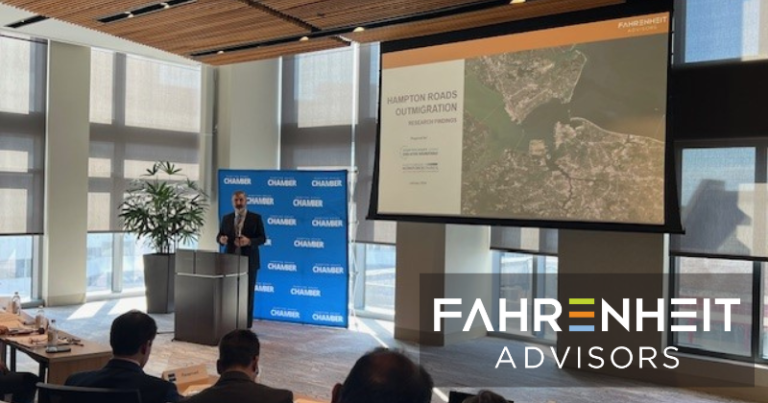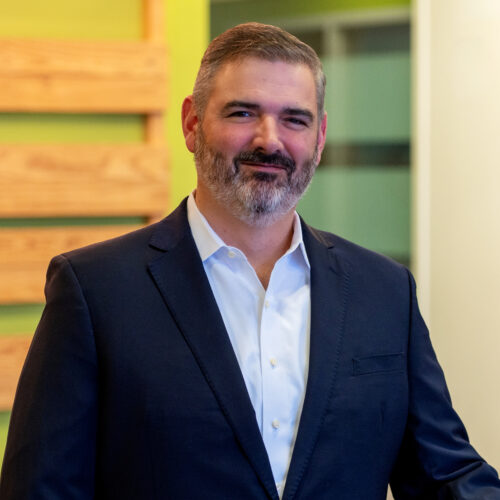Disruption Proofing a Metropolitan Region

The Hampton Roads Executive Roundtable, and the Hampton Roads Workforce Council (HRWC) partnered to conduct research to reveal the causes of outmigration from Hampton Roads, Virginia. Fahrenheit Advisors was engaged by the groups to perform the research and provide important insights, identifying a number of key factors that are driving outmigration from Hampton Roads.
The research uncovered factors that motivate individuals as well as entrepreneurs and start-up founders to come to, remain in, or relocate away from Hampton Roads. For several years, regional leaders have monitored US Census data for outmigration trends of key population segments in Hampton Roads. Recent analyses by several respected institutions have described the scope, scale, and character of this outmigration pattern. Although anecdotes and hypotheses have been proposed to explain this trend, no study provided actionable material evidence to reveal contributing factors that can be addressed by regional leaders. The study insights will be used to inform a strategic action plan addressing talent retention and attraction, including marketing and branding strategies for the Hampton Roads region.
Highlights of the study’s findings included:
How serious is the outmigration Issue?
- When asked how likely it is that they would be living in Hampton Roads in five years, 10% of respondents said it was unlikely or very unlikely. Another 15% said they weren’t sure.
What types of people are most likely to leave?
- Younger people who moved to the region as adults, work remotely, are not connected to the military, and do not have children at home were most likely to say they may leave Hampton Roads in the next five years.
Why are they leaving?
- The top factors driving outmigration were cost of living, safety/crime, job/career opportunities, and availability of healthcare.
- Interestingly, people who said they had returned to Hampton Roads after living elsewhere—referred to in the study as “Boomerangs”—said a key reason they came back was that the cost of living was more attractive here.
The region’s identity crisis continues:
- Only 23% of respondents said they considered the Hampton Roads region “a single, unified community.”
- When asked how they describe where they live to someone from outside the area, 43% said “Hampton Roads”, while 23% said they just say their specific city, town, or county. Only 8% said they refer to the area as “The 757.”
The Region is making progress in terms of entrepreneurship and innovation, but much work remains:
- Start-up founders, investors, and other interviewees involved in the entrepreneurial ecosystem strongly believe the region has the potential to become a world-class hub for innovation and entrepreneurship.
- They were also nearly unanimous in their assessment that the environment for innovation and entrepreneurship in Hampton Roads has improved dramatically in the past two decades.
- However, they pointed to the fragmented political geography of Hampton Roads—which is comprised of some 17 separate localities—a key obstacle to realizing the region’s potential.
- While there is an abundance in the region of early-stage resources for newly launched start-ups, interviewees cited a lack of awareness of the region among venture capitalists located elsewhere which can make it more difficult for local founders to raise post-seed capital.
“Our goal in partnering with Fahrenheit was to clearly define and understand the specific challenges our region is facing with talent retention and attraction, and to inform regional solutions ahead,” said Nancy Grden, President & CEO, Hampton Roads Executive Roundtable. “With the new clarity this report provides, we are now working with our regional and Commonwealth of Virginia partners to identify solutions for retaining and attracting talent, and for communicating the exciting ‘power of place’ here in Hampton Roads.”
“Knowing the obstacles we face will empower us to change the trajectory of key factors influencing the dynamics of our region and its ultimate growth,” said Shawn Avery, President & CEO, Hampton Roads Workforce Council. “It is our intent to leverage these findings with real action to help shape the Hampton Roads region as a place people and businesses not only want to come to, but most importantly, want to stay and work. We want Hampton Roads to be a place that motivates people and businesses to put down permanent roots and build a life as part of a vibrant and stable community, a community with a promising present and bright future with many opportunities.”
Fahrenheit Advisors surveyed 511 people currently living in Hampton Roads in December of last year. They also conducted 37 individual interviews with people involved in the entrepreneurial ecosystem in Hampton Roads. These included start-up founders/CEOs, economic developers from the various localities, leaders of start-up incubators and accelerator programs, and investors.
The complete “Hampton Roads Outmigration” research findings report is publicly AVAILABLE FOR REVIEW HERE.
Outmigration and regional identity/branding have been identified by the Regional Organizations Presidents Council as major priorities to address in the region. The Roundtable and HRWC are both members of this 11-member group and led this initiative on their behalf. The Roundtable and Workforce Council are leading regional presentations and outreach meetings with key audiences and stakeholders to develop a regional action plan.
FAHRENHEIT’S STRATEGIC PLANNING PRACTICE
Whether you are expanding to new locations or seeking answers for underperformance, strategic planning is the best way to prepare for whatever’s next. If you’re ready to spend less time researching and more time executing, Fahrenheit has the expertise to help you manage your industry’s greatest challenges. Contact us today to get started.
RESEARCHER, MANAGING DIRECTOR
 Peter Grimm leverages his background in national security and experience as a strategy consultant and PE-backed CEO to help clients navigate rapidly changing environments. He is skilled in corporate strategy, market analysis, competitive intelligence, disruption planning, disruption preparedness, and organizational leadership.
Peter Grimm leverages his background in national security and experience as a strategy consultant and PE-backed CEO to help clients navigate rapidly changing environments. He is skilled in corporate strategy, market analysis, competitive intelligence, disruption planning, disruption preparedness, and organizational leadership.
Connect with Peter on LinkedIn.

